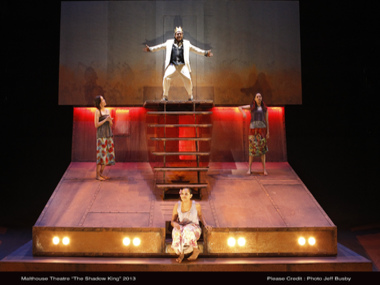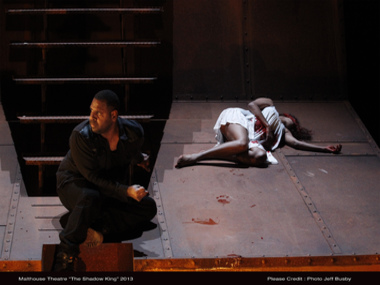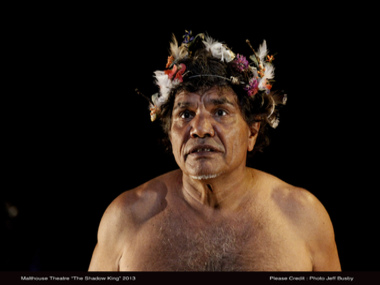THE SHADOW KING/LEAR

Arrival of the King - Tom E Lewis greets his daughters (l to r) Regan (Natasha Wanganeen), Cordelia (Rarriwuy Hick) and Goneril (Jada Alberts) - photo by Jeff Busby
Posted by Jeremy Eccles | 03.02.14
An ebullient black King Lear in a white suit arrives regally on high and breaks into a “We have survived” rap. Where are we? In Joan Littlewood's Stratford East? Barrie Kosky's Berlin? Or Michael Kantor's Malthouse Melbourne?
In fact, the latter (now transferred to Sydney for the Festival) – where the exciting young director has teamed with Murrungun actor/director Tom E Lewis to offer a reconsideration of Shakespeare's great tragedy along similar lines to Singapore's Ong Ken Sen, who seized on our familiarity with that story to bring out the distinctiveness in different Asian performing traditions – the King killed in Peking opera style and dying in Kabuki. In 'The Shadow King', though, it is much less performance that we're being invited to study; much more the different attitudes to land ownership that lie at the hearts of Western feudalism and Aboriginal land rights.
And the key line in the whole play is Cordelia's “Daddy, you can't give me what you don't own” - a notion that Shakespeare wouldn't have dared to utter, as well as being both a summation of the essential Indigenous belief about Country and community land rights, and an example of the unvarnished use of the English language to communicate the core of this story. Other parts come in Yolngu Matha and Aboriginal Kriol as different characters pinpoint their identity through a precise linguistic personality that replaces the make-up and costuming of an ordinary 'Lear'. And, amazingly, there's a poetry and a sense of geographic if not temporal distance in kriol that's a decent challenge to Shakespeare's own tongue.
Gloucester – now a woman elder – is the ultimate holder to tradition, clinging to her horoscopes and dilly-bag, doubting that her Edgar could be as bad as the bastard Edmund insists, and speaking largely in language. Edgar's Poor Tom becomes an ochred mokoy spirit; Edmund's baddie brother has the finest of English in Jim Bani's accomplished mouth – but his ambitions are tainted by a colonial lust for royalties; while the ugly sisters – Goneril and Regan – join the generational chorus in declaring that “the old people have no sense of the big world out there”.
Tommy Lewis, son of both Arnhemland and one its greatest landscape artists, Angelina George, was at the heart of this production from its inception. He knows all about both stage-craft and being a King....no shadow he at the beginning of events. Just keen to spend more time with the band (Selwyn Burns and Bart Willoughby of Mixed Relations) who are, in his daughters' eyes, what Lear's knights once were – troublesome, noisy humbuggers! Does Lear's “unburdening” also include an escape from the white bureaucracy which, I think, received a passing reference? Could the father handing ceremonial authority to his daughters also be a reversal of Arnhemland's still-told stories about the end of the Matriarchy? And should Lear's golden crown in fact have been a tin King Plate – for it was the colonialists who issued them who'd invented the notion of kinghood for the much more gerontocratic Aboriginals elders?
But as his world falls around his shoulders, Lear instinctively heads for his Country “to dance with his totems”, and the old music replaces the new as the wonderful Djakapurra Munyarryun cries thrillingly for him. The mock trial of Lear's daughters is given a cheeky twist as Kamahi Djordon King's Fool/Narrator camply impersonates them.
But we never quite engage as deeply with these characters as Shakespeare would have us do – relishing the deceit and deaths of the baddies and caring as old Gloucester is blinded, even weeping as Lear staggers in under the burden of the murdered Cordelia to declare, “And my poor fool is hanged”.
Given the production's intent to limit the story to those parts with Indigenous relevance, should we have had even more references to land, as worked so well with the Whitlamesque gesture of Cordelia's, pouring the stage sands into the King's hands and declaring, “The land is us”? That would at least have got up the nose of Melbourne academic Peter Conrad who used a recent 'Monthly' article to announce: “The land does not own us, even if we are buried in it. The myth of the songlines is as proprietorial as the fussing of colonists about borders and fences, and equally deluded”.
This intriguing production will be touring other festivals later this year.
URL: http://www.sydneyfestival.org.au
Share this:
»  del.icio.us
»
del.icio.us
»  Digg it
»
Digg it
»  reddit
»
reddit
»  Google
»
Google
»  StumbleUpon
»
StumbleUpon
»  Technorati
»
Technorati
»  Facebook
Facebook
Contact Details

Black-hearted Edmund (Jim Bani) with the dead Regan (Natasha Wanganeen) - photo Jeff Bsuby

Tommy Lewis as the mad King - photo by Jeff Busby
Further Research
Artists: Angelina George
News Tags: Jeremy Eccles | Jim Bani | King Lear | Michael Kantor | Sydney Festival | Tom E Lewis
News Categories: Blog | Event | News | Other Event
Exhibition Archive
- 10.10.17 | TARNANTHI 2017
- 11.08.17 | Natsiaas 2017
- 20.07.17 | APY ART DOMINATES THE WYNNE
- 17.07.17 | Anangu Artist Wins $100,000 Prize
- 14.07.17 | The End of AAMU
- 11.07.17 | ART ACROSS THE COUNTRY
- 11.07.17 | TARNANTHI IN OCTOBER
- 05.07.17 | TJUNGUṈUTJA - from having come together
- 13.06.17 | Ghost-Nets Straddle the World
- 07.06.17 | Grayson Perry Going Indigenous?
- 05.06.17 | Barks Bigger than Ben Hur
- 27.05.17 | NGA QUINQUENNIAL 2017
- 21.05.17 | Blak Douglas Finds Home at the NGA
- 21.05.17 | BRIAN ROBINSON WINS HAZELHURST WOP
- 18.05.17 | PARRTJIMA 2.0
Advertising

